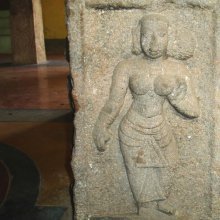Asthana, Asthāna, Āsthāna: 16 definitions
Introduction:
Asthana means something in Buddhism, Pali, Hinduism, Sanskrit, the history of ancient India, Hindi. If you want to know the exact meaning, history, etymology or English translation of this term then check out the descriptions on this page. Add your comment or reference to a book if you want to contribute to this summary article.
Images (photo gallery)
In Buddhism
Mahayana (major branch of Buddhism)
Source: academia.edu: A Study and Translation of the GaganagañjaparipṛcchāAsthāna (अस्थान) refers to “improper” (e.g., ‘one who knows what is improper’), according to the Gaganagañjaparipṛcchā: the eighth chapter of the Mahāsaṃnipāta (a collection of Mahāyāna Buddhist Sūtras).—Accordingly, “How then, son of good family, does the Bodhisattva appear to many beings performing the deeds of a Buddha (buddhakārya) even when the Buddhas do not appear? Son of good family, (1) the Bodhisattva has perfected the purification of the ten powers by knowing what is proper and what is improper (asthāna-jñāna); (2) he has perfected the purification of the four fearlessness by knowing the cessation of impurities; (3) he has perfected the purification of the eighteen special qualities of the Tathāgata by knowing the unattached knowledge of the three times; [...]”.

Mahayana (महायान, mahāyāna) is a major branch of Buddhism focusing on the path of a Bodhisattva (spiritual aspirants/ enlightened beings). Extant literature is vast and primarely composed in the Sanskrit language. There are many sūtras of which some of the earliest are the various Prajñāpāramitā sūtras.
India history and geography
Source: Singhi Jain Series: Ratnaprabha-suri’s Kuvalayamala-katha (history)Āsthāna (आस्थान) refers to a particular place in the Heavenly abodes (of the deities), as commonly depicted on the Saṃsāracakra paintings (representing scenes of heaven and hell), in ancient India, as mentioned in the Kathās (narrative poems) such as Uddyotanasūri in his 8th-century Kuvalayamālā (a Prakrit Campū, similar to Kāvya poetry).—Page 185.21 f.: Here follows a description of a printed scroll illustrating the Jaina conception of saṃsāracakra. [...] The saṃsāra-cakra illustrated the three worlds of hell, human world and the world of gods. [...] Then follows a description of the various hells depicted in the painting on cloth (p. 189.18-9). There is given also a description of the Svargaloka or the heavenly abode of Devī, Devakumāra and Indra seated in the Āsthāna or Saudharmasabhā (p. 189.32-3, p. 190.1-19).
Source: academia.edu: Tessitori Collection I (history)Asthana refers to one of the twelve Kāyastha groups from Māthurā, according to the “Samoṣaṇa Kāitha Māthura-rāsa” (dealing with caste history), and is included in the collection of manuscripts at the ‘Vincenzo Joppi’ library, collected by Luigi Pio Tessitori during his visit to Rajasthan between 1914 and 1919.—In between the work deals with the legendary origin of the Kāyasthas as sons of Citragupta, himself born from Brahmā’s body. The Māthura Kāyasthas are one of the twelve Kāyastha groups. (In modern terms, e.g., Asthana, [...]).

The history of India traces the identification of countries, villages, towns and other regions of India, as well as mythology, zoology, royal dynasties, rulers, tribes, local festivities and traditions and regional languages. Ancient India enjoyed religious freedom and encourages the path of Dharma, a concept common to Buddhism, Hinduism, and Jainism.
Languages of India and abroad
Sanskrit dictionary
Source: DDSA: The practical Sanskrit-English dictionaryAsthāna (अस्थान).—a. Very deep.
-nam 1 A bad or wrong place; अस्थाने पततामतीव महतामेतादृशी स्याद् गतिः (asthāne patatāmatīva mahatāmetādṛśī syād gatiḥ) S. D.
2) An improper place or object or occasion; °वर्षी (varṣī) Daśakumāracarita 81 (= apātradāyin); अस्थानं परिभूतेः (asthānaṃ paribhūteḥ) K.45.
--- OR ---
Āsthāna (आस्थान).—
1) A place, site.
2) Ground, base.
3) An assembly; आस्थानाध्यासनाश्रितः (āsthānādhyāsanāśritaḥ) Bhāgavata 6.7.5.
4) Care, regard; see आस्था (āsthā).
5) A hall of audience; K.8,14.
6) Recreation ground (viśrāmasthānam).
-nī An assemblyroom. आस्थानीं समये समं नृपजनः सायंतने संपतन् (āsthānīṃ samaye samaṃ nṛpajanaḥ sāyaṃtane saṃpatan) Ratna. निजामशाहमास्थानीमेत्य सिंहासने स्थितम् (nijāmaśāhamāsthānīmetya siṃhāsane sthitam) Ś B.3.8.
Derivable forms: āsthānam (आस्थानम्).
Source: Cologne Digital Sanskrit Dictionaries: Edgerton Buddhist Hybrid Sanskrit DictionaryAsthāna (अस्थान).—nt. (= Pali aṭṭhāna), opp. sthāna (4, 5), q.v., (1) an impossibility, generally followed by a clause introduced by yat: Lalitavistara 232.17 asthānam etad…yat kumāro aprāpya bodhiṃ punar iha āgameyā, it is im- possible that the prince should return here without having attained enlightenment; Avadāna-śataka ii.4.6; often followed by the synonym anavakāśo (yat…), as in Pali aṭṭhānaṃ (etaṃ) anavakāso: Gaṇḍavyūha 498.5; Divyāvadāna 174.1; 207.9; 264.5; 270.13—14; Daśabhūmikasūtra 25.14; Laṅkāvatāra-sūtra 198.9 asthānam anavakāśaṃ coktaṃ; in [compound] sthānāsthāna, possibilities and impossibilities, sound and unsound propositions or conclusions, Bodhisattvabhūmi 4.8; Mahāvastu i.134.12 sarvakarmeṣu nānāsthānāsthānakuśalāḥ clever in regard to various sound and unsound conclusions (or, possibilities and impossibilities) in dealing with all actions; sthānāsthāna-jñāna (Pali ṭhānaṭṭhāna-ñāṇa), knowledge of…, the first of the 10 bala of a Tathāgata, Mahāvyutpatti 120; Dharmasaṃgraha 76; Lalitavistara 433.4; (2) impropriety (this is closer to Sanskrit usage, [Boehtlingk and Roth] and [Boehtlingk]): in Mahāvastu i.101.7 read asthānato for mss. asthānanto (Senart em. asthānatāye, unmetrical(ly)) from (because of) non-place, non-propriety, impropriety, see s.v. asthānatā.
Source: Cologne Digital Sanskrit Dictionaries: Shabda-Sagara Sanskrit-English DictionaryAsthāna (अस्थान).—mfn.
(-naḥ-nā-naṃ) See asthāga. n.
(-naṃ) A place where there is no firm footing. adv. Unsuitably, unseasonably. E. a neg. and sthāna stopping.
--- OR ---
Āsthāna (आस्थान).—nf. (-naṃ-nī) An assembly. n.
(-naṃ) 1. Place, site. 2. Staying, abiding. 5. Pains, care. E. āṅ before sthā to stay or stand, lyuṭ and ṅīp affs.
Source: Cologne Digital Sanskrit Dictionaries: Benfey Sanskrit-English DictionaryĀsthāna (आस्थान).—i. e. ā-stha + ana, n. and f. nī, An assembly, [Rājataraṅgiṇī] 5, 35.
Source: Cologne Digital Sanskrit Dictionaries: Cappeller Sanskrit-English DictionaryAsthāna (अस्थान).—[neuter] no stay; no place or the wrong place for (gen). °— & [locative] in the wrong place, not in time, without cause.
--- OR ---
Āsthāna (आस्थान).—[neuter] stand, station place, basis for operation; also = [feminine] āsthānī audience or assembly hall.
Source: Cologne Digital Sanskrit Dictionaries: Monier-Williams Sanskrit-English Dictionary1) Asthāna (अस्थान):—[=a-sthāna] n. non-permanency, inconstancy (as of a sound), [Jaimini]
2) [v.s. ...] not a (fit) place for ([genitive case]), [Kādambarī]
3) [v.s. ...] impossibility, [Divyāvadāna]
4) [v.s. ...] an army which has lost its chief, [cf. Lexicographers, esp. such as amarasiṃha, halāyudha, hemacandra, etc.]
5) [=a-sthāna] mfn. deep, [cf. Lexicographers, esp. such as amarasiṃha, halāyudha, hemacandra, etc.]
6) Āsthāna (आस्थान):—[=ā-sthāna] [from ā-sthā] n. place, site, ground, base, [Vājasaneyi-saṃhitā; Atharva-veda; Śatapatha-brāhmaṇa]
7) [v.s. ...] an assembly
8) [v.s. ...] a hall of audience, [Kathāsaritsāgara; cf. Lexicographers, esp. such as amarasiṃha, halāyudha, hemacandra, etc.]
Source: Cologne Digital Sanskrit Dictionaries: Yates Sanskrit-English Dictionary1) Asthāna (अस्थान):—[a-sthā+na] < [a-sthāna] (naḥ-nā-naṃ) a. Idem. n. Unseasonable, inopportune.
2) Āsthāna (आस्थान):—[ā-sthāna] (naṃ) 1. n. Assembly; place.
Source: DDSA: Paia-sadda-mahannavo; a comprehensive Prakrit Hindi dictionary (S)Asthāna (अस्थान) in the Sanskrit language is related to the Prakrit words: Aṭṭhāṇa, Atthāṇa.
[Sanskrit to German]
Sanskrit, also spelled संस्कृतम् (saṃskṛtam), is an ancient language of India commonly seen as the grandmother of the Indo-European language family (even English!). Closely allied with Prakrit and Pali, Sanskrit is more exhaustive in both grammar and terms and has the most extensive collection of literature in the world, greatly surpassing its sister-languages Greek and Latin.
Hindi dictionary
Source: DDSA: A practical Hindi-English dictionaryĀsthāna (आस्थान) [Also spelled asthan]:—(nm) a base.
...
Kannada-English dictionary
Source: Alar: Kannada-English corpusAsthāna (ಅಸ್ಥಾನ):—[noun] an improper place.
--- OR ---
Āsthāna (ಆಸ್ಥಾನ):—
1) [noun] a place; a site; ground.
2) [noun] a royal assembly or the hall; a royal court.
Kannada is a Dravidian language (as opposed to the Indo-European language family) mainly spoken in the southwestern region of India.
Nepali dictionary
Source: unoes: Nepali-English DictionaryĀsthāna (आस्थान):—n. 1. place of assembly; 2. session; 3. temple; shrine;
Nepali is the primary language of the Nepalese people counting almost 20 million native speakers. The country of Nepal is situated in the Himalaya mountain range to the north of India.
See also (Relevant definitions)
Starts with (+3): Astanakolai, Astanam, Astanamantapam, Astanasantoshi, Asthanageha, Asthanagriha, Asthanajnana, Asthanakavi, Asthanamamtapa, Asthanamandapa, Asthananiketana, Asthanapada, Asthanapamdita, Asthanapatta, Asthanasamasa, Asthanasthapada, Asthanasthasamasa, Asthanata, Asthanavak, Asthanavastunayaka.
Ends with (+370): Abharanasthana, Abhidharmajnanaprasthana, Abhisarasthana, Adhikarasthana, Agamasthana, Aghatasthana, Agnyupasthana, Agrasthana, Aharanirgamasthana, Ajnasthana, Alamkaraprasthana, Alidhasthana, Alokasthana, Anaghasthana, Anasthana, Anavasthana, Angaprasthana, Anigrahasthana, Anikasthana, Anucitasthana.
Full-text (+31): Atthana, Asthanamandapa, Anasthana, Asthanagriha, Astanakolai, Asthaga, Anavakasha, Asthane, Ashramasthana, Aghatasthana, Asthani, Asthanata, Astanasantoshi, Anvasthana, Asthan, Attani, Asthanasthapada, Asthanayukta, Kolumantapam, Asthasnu.
Relevant text
Search found 11 books and stories containing Asthana, Asthāna, Āsthāna, A-sthana, A-sthāna, Ā-sthāna; (plurals include: Asthanas, Asthānas, Āsthānas, sthanas, sthānas). You can also click to the full overview containing English textual excerpts. Below are direct links for the most relevant articles:
Sahitya-kaumudi by Baladeva Vidyabhushana (by Gaurapada Dāsa)
Text 7.82 < [Chapter 7 - Literary Faults]
Text 7.52 < [Chapter 7 - Literary Faults]
Text 7.71 < [Chapter 7 - Literary Faults]
Maha Prajnaparamita Sastra (by Gelongma Karma Migme Chödrön)
Part 3 - The recollections according to the Mahāyāna < [Chapter XXXVI - The eight recollections (anusmṛti or anussati)]
III. Definition of the ten powers (bala) according to the Daśabalasūtra < [Part 1 - General questions]
I. The power of the possible and the impossible (sthānāsthāna-jñānabala) < [Part 2 - The ten powers in particular]
Significance of the Moon in Ancient Civilizations (by Radhakrishnan. P)
7. Chandra-kriya in Astrology < [Chapter 5 - Adoration of the Sun and Moon]
Preceptors of Advaita (by T. M. P. Mahadevan)
Other Reviews < [October 1958]
Buddhism in Andhra – Its Arrival, Spread and < [July – September, 1994]
The Matsya Purana (critical study) (by Kushal Kalita)
Part 2 - Fort (durga) architecture in the Matsyapurāṇa < [Chapter 7 - Art and Architecture in the Matsyapurāṇa]

